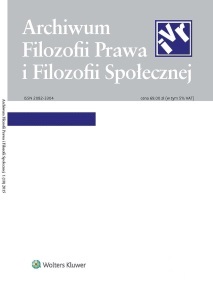Krytyczna analiza dyskursu sądowego dotyczącego prawnej sytuacji osób homoseksualnych w świetle art. 18 Konstytucji RP
Critical analysis of a judicial discourse on the legal situation of homosexuals in the light of Article 18 of the Constitution of the Republic of Poland
Author(s): Wojciech ZomerskiSubject(s): Law, Constitution, Jurisprudence, Constitutional Law, Philosophy of Law
Published by: Stowarzyszenie Filozofii Prawa i Filozofii Społecznej – Sekcja Polska IVR
Keywords: homosexuality; article 18 of the Constitution; Critical Discourse Analysis; discrimination; ideology; doxa; interpellation
Summary/Abstract: In this paper, I make an attempt to conduct a critical analysis of judicial discourse devoted to the situation of homosexual persons in the light of Article 18 of the Constitution of the Republic of Poland. In order to show how unequal treatment of homosexuals is being reproduced, I analyze selected rulings of the Polish Constitutional Tribunal, Supreme Court and administrative courts. On the methodological level I refer to the Critical Discourse Analysis. In the result, the analysis of chosen rulings is conducted in the attempt to spot linguistic maneuvers leading to the reproduction of unequal treatment of homosexuals. Thus, in the course of this analysis I apply such notions as interpellation (Althusser), ideology (Žižek), doxa and habitus (Bourdieu). On the whole, I argue that the flawed interpretation of Article 18 is the result of referring to established judicial standpoint, illegitimate departures from linguistic interpretation, or many kinds of concealment and counterfactual premises. The origins of doxa that is the basis of such practice, might be seen in the Catholic doctrine which is based on the assumption of unnatural character of homosexuality and subordination of human sexuality to aims of procreation. In the end, I come to the conclusion that unmasking of axiological presuppositions underlying interpretation of the analyzed provision would fundamentally change the character of discussion devoted to the legal situation of homosexuals, satisfying Habermasian standards of deliberative democracy, and it might eventually lead to recognition of one-sex relations by legislator.
Journal: Archiwum Filozofii Prawa i Filozofii Społecznej
- Issue Year: 15/2017
- Issue No: 2
- Page Range: 80-97
- Page Count: 18
- Language: Polish

